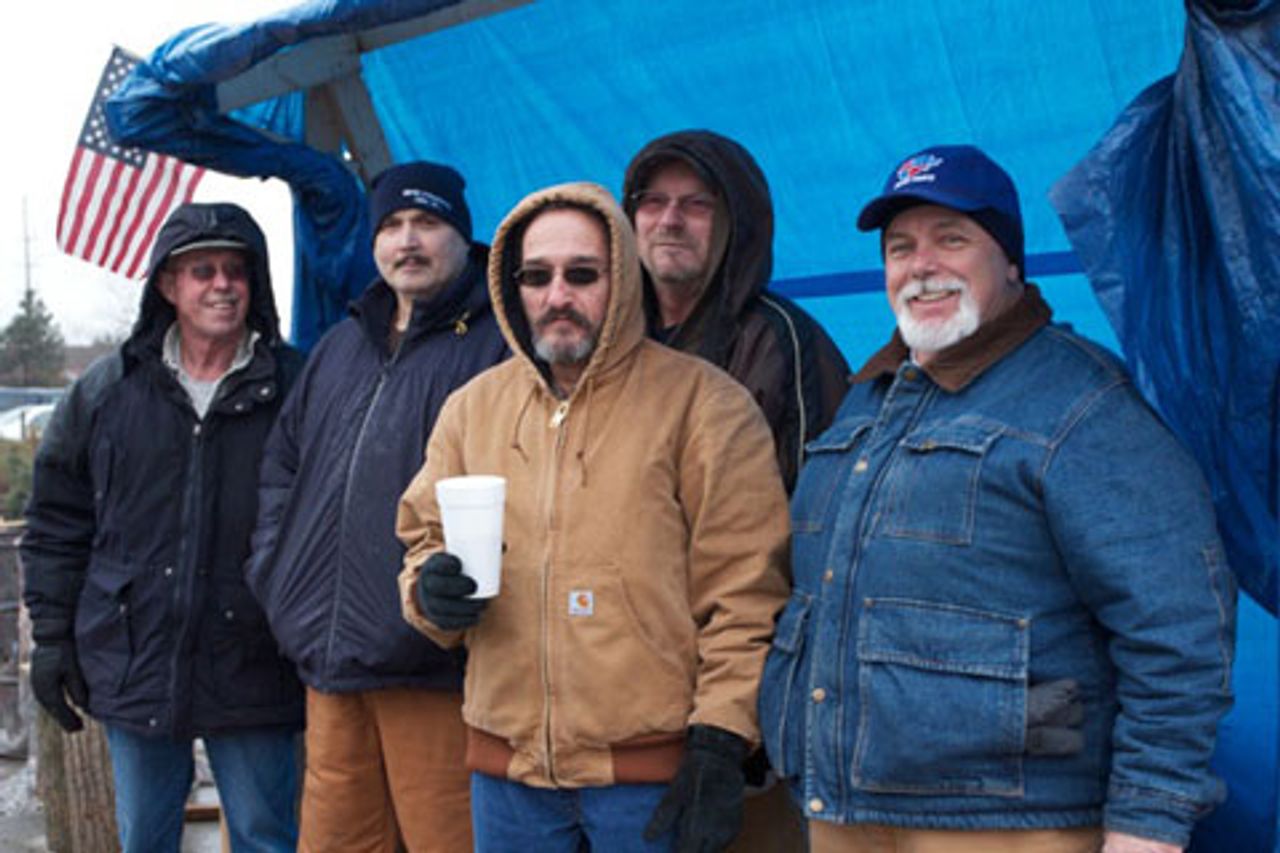 Picketers in Findlay
Picketers in FindlayCooper Tire workers in Findlay, Ohio talked to the World Socialist Web Site this week about the issues raised by their struggle. The fight by 1,050 tire workers against the wage-cutting demands of the multinational corporation has entered is seventh week.
The corporation has refused to return to the bargaining table and has bussed in strikebreakers from North Carolina and other states to continue production. Meanwhile, security guards are maintaining round-the-clock video surveillance of picketers, and two workers have been framed up on misdemeanor charges of “menacing” a strikebreaker. City officials have also torn down signs supporting the locked out workers, claiming they violate an ordinance.
Meanwhile, the contract covering 1,500 workers at the company’s only other unionized plant in the US—in Texarkana, Arkansas—is expiring January 20. Although workers voted overwhelming for strike action, the United Steelworkers (USW) has rejected any joint struggle by workers, and has repeatedly demonstrated its willingness to accept further concessions.
“Our fate is bound up with the Texarkana workers,” said Rob Gussard, a young worker. “In ’05 they struck for a month. Then the company reopened the five-year agreement in ’08 to see where they would get the deepest cuts. Now they want us to sign a blank check and make us take concessions that are even worse than in ’08.”
Referring to the tax abatements and other concessions the city gave to Cooper after it threatened to close the plant, Gussard said, “My water bill went through the roof to pay for the free water Cooper is getting.” Angered over the ever-increasing pay for top Cooper executives and others, he added, “Now the new CEO of Apple is going to make $378 million.”
Joseph, a veteran worker, said, “You keep hearing the economy is getting better. Whose economy? They don’t want to talk about my economy. People can’t live this way. The lower classes outnumber those on top. That’s why the people who have had enough are driving out all the dictators in the Middle East. You can only suppress the majority for so long.”
Many workers expressed anger over the fact that the USW has only handed out a few weeks’ worth of $100 gift cards to workers who have gone without a paycheck for a month and a half. The union strike fund is worth at least $150 million.
“The Steelworkers is one of the richest unions in the country,” Joseph said. “We haven’t got a raise in seven years but union dues have steadily gone up.”
 Doug Graham
Doug GrahamDoug Graham, a worker with 20 years at Cooper, added, “It’s going back to the 1930s. I lost $30,000 a year when they changed working hours and eliminated overtime after eight hours of work. We’re working 12 hours a day. People fought and died for the eight-hour day and now it’s gone.
“My dad was a coal miner, and I was born and raised in southern West Virginia, in McDowell County. He told me stories of how the miners had to fight for everything they got.”
Tom, with 22 years, said, “It used to be a union—now they’ve made it a business. We’re all divided. The young guys are not getting a pension. Soon they are going to be the majority in here. Then the company will offer them a small raise if they vote to get rid of our pension.
 Tom Kostyo
Tom Kostyo
“Before I came here I worked 20 years for Denman Tire in Warren, Ohio. It was a union shop, and it was closed. I hate to go back there or to Youngstown. It’s nothing but closed plants. My dad worked for Republic Steel. They used to have 5,000 workers there. Now there are 600.”
Scott, at Cooper for 18 years, said, “As a group we said enough was enough. One of the managers told us the new proposal was going to save the company $5 million to $7 million. I asked, ‘what about the $30 million you already took from us in ’08?’ He didn’t answer.
“Whether it’s a Democrat or Republican in there they are not for the working class or the poor. They are only fight for the ones with the big money,” Scott addd.
“In working class families our kids wonder why we have to work as hard as we do. But I feel sorry for them. Twenty years ago it was not like it is now. When they locked us out, we said either we take a stand now or when it comes to the next contract it will be even worse.”
 Diana and Christa
Diana and ChristaDiana Boes, a worker with 12 years, said, “My mom has worked for Cooper 37 years. My dad retired after 28 years. What’s going on is heartbreaking and surreal. We have to calm her down because she’s very bitter, and we don’t want her to have a heart attack.
“I used to work at Findlay Industries, a car parts maker that is closed now. When I hired in at Cooper it was like ‘cha-ching’ I won the lottery. It couldn’t get any better. At first we were working eight hours a day, six days a week. It didn’t really bother me and you got to know your fellow workers like family, and we’d go out after work. Then it went to 12 hours a day in ’05 and ’06. It became completely different.”
Christa Hohenbrink, with four years at Cooper said, “I graduated in 1997. I knew the way things were around here. I wasn’t going to get rich, but I would be in the lower working class. I got a job a Filtech, a Japanese-owned company that made parts for Honda, but I hated it. When I got into Cooper my parents were proud of me. My dad who works at General Motors in Defiance and is in the United Auto Workers (UAW) said, ‘You are going to get pension and you will never need another job.’
“Now its completely different. In the days leading up to the lockout I saw supervisors and union workers almost getting into fistfights.
“How much money do the executives need?” Diana continued, “Who is going to buy the products if no one can afford to buy the products? When I was 21, I was making $173 a week and giving my daughter a bath with a kerosene heater. We were so poor and living paycheck to paycheck. Now I work two jobs, here at Cooper and at a nursing home. Every other week I was bringing home $1,000, but I would only have 3 or 4 days off a month.
“The non-profit nursing home gave me a turkey for the holidays. What did Cooper Tire do? They locked me out.
“I can’t believe we’re not seeing this on Good Morning America, and they’re not making an issue of this on ABC News and the national media. It’s happening everywhere—the lockout at American Crystal Sugar has been going on for months. Now the Caterpillar workers in Canada have been locked out. It’s like the dirty little secret of America.
“How can the government allow the company to lock us out and bring in scabs? But then I see how they treated the Wall Street protesters, like they weren’t human. It’s like, ‘It doesn’t matter if I injure you, you’re going to get out of my way.’
“The people in the Ivory Tower aren’t willing to take pay cuts. My average pay is $21 an hour, and you have to budget for that. Then you come in, and they say you have to slash your budget. How do I cut more? Right now I’m just trying to make my house note.”
Subscribe to the IWA-RFC Newsletter
Get email updates on workers’ struggles and a global perspective from the International Workers Alliance of Rank-and-File Committees.
